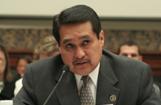Five decades after Brown v. Board of Education, we still do
not offer all children the same educational opportunities. In addition
to the achievement gap between low-income and minority children and
their peers, American students suffer from a second kind of achievement
gap when compared globally. Across income and background levels in math
and science, our children go from among the top students in the world
in the fourth grade to near the bottom by the twelfth grade. We have
one of the highest dropout rates in the world.
The
Committee on Education and Labor is working to close the achievement
gap so all children are able to get the skills they need to succeed.
Key Legislation:
No Child Left Behind »21st Century Green High-Performing Public Schools Facilities Act »No Child Left Inside Act »
WASHINGTON, D.C. – Schoolchildren around the country have been subject to abusive – and in some cases fatal – uses of seclusion and restraint by school administrators, teachers and staff, according to a new report released today by the National Disability Rights Network. The report, the first national effort to examine these practices in both public and private schools identified hundreds of cases where the abusive and negligent use of seclusion and restraint injured or traumatized students, many of whom were disabled. In several cases, students died.
With the U.S. facing staggering rates of child obesity, the Committee will hold a hearing on Thursday, July 24 at 10 a.m., to examine how to improve physical education in the nation’s schools and strengthen efforts to fight childhood obesity.
“The Benefits of Physical and Health Education for Our Nation’s Children”
On Thursday, July 17 at 10:00 a.m., the Committee will hear from mayors and school superintendents of major U.S. cities, including New York City, Washington, D.C., Chicago, and Atlanta, at a hearing on their challenges and successes in working to improve public schools.
The House Education and Labor Committee held a hearing to examine a recent report released by the National Mathematics Advisory Panel on the state of math education and instruction in the United States. Among other things, the report found that the nation’s system for teaching math is “broken and must be fixed” if the U.S. wants to maintain its competitive edge.
The Committee held a hearing to examine how to improve nutrition and food safety in the nation’s schools. Last month, the U.S. Department of Agriculture ordered the largest recall of meat in the nation’s history after investigations revealed that meat from non-ambulatory (or "downer") cows at a California slaughterhouse had been allowed to enter the food supply. More than a third of the tainted meat had gone to federal nutrition programs, including to schools.

